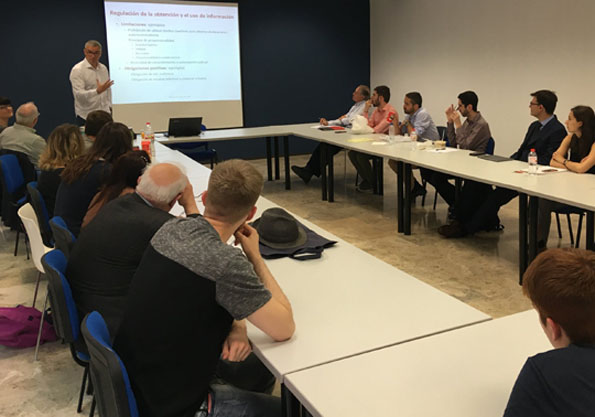A group of the Universitat de València publishes the first complete legal analysis on the conflict between taxi and hired cars with drivers
- Press Office
- August 1st, 2018

A research group of the Universitat de València has recently published the first complete and exhaustive analysis on the shared transport regulation in Spain. The analysis of the problems of taxi regulation and the best way of improve and adjust it, but especially thee social, economic and legal impact due to the appearance of new services such as Uber or Cabify, and its business model, for which the famous licences of hired cars with drivers must be used in Spain.
This work includes contributions of specialists from other universities and the transport market regulation institutions. The book has been coordinated by the professors Gabriel Doménech Pascual, Ana María de Encarnación Valcárcel and Andrés Boix Palop, all three from the Department of Administrative Law in the Universitat de València.
La regulación del transporte colaborativo is the title of the book, which studies both the Spanish situation and the one in other closer countries, such as the United Kingdom, France, Italy and the United States. The traditional reasons why passenger transport in passenger cars was only competence of public sector locally, and the reasons why, in the current social and economic context, have no longer no justification. Moreover, the competitive dynamics generated by the appearance of digital platforms and its positive effects (for example, for consumers, price or the efficiency of the sector) are also explained, as well as the other side of the model (a more precarious job due to the lack of proper regulation). Lastly, together with some studies on the effects of congestion and pollution in cities, and from a sustainable urban mobility point of view, a need of regulation is considered. Thus, some concrete proposals on the sector’s regulation to achieve both service efficiency and social equity on worker’s rights and a better socioeconomic and environmental sustainability of the cities, particularly in its centres.
The book includes many lectures from the First International Congress on Collaborative Economy Regulation, which took place in Valencia in 2016. It is the result of some works carried out by the Research Group of the Universitat de València, specialised in the study of the effects of the economic regulation in both Spain and the European Union, which was sponsored by both the Spanish and Valencian governments.
File in: Investigació a la UV
















